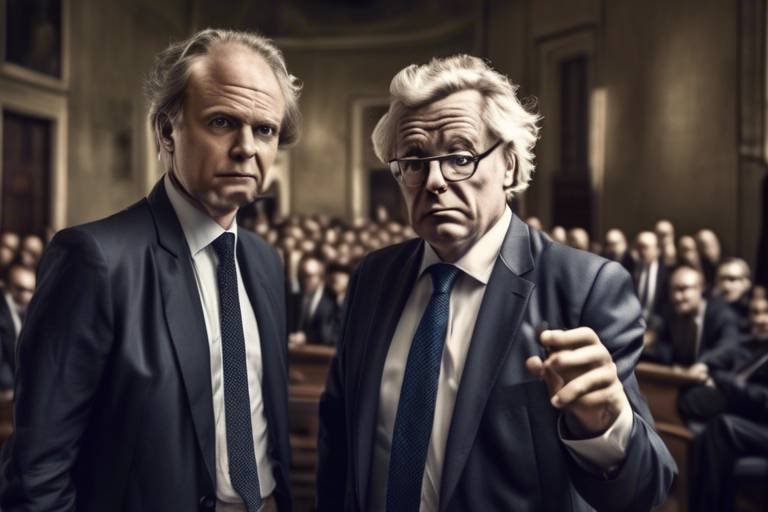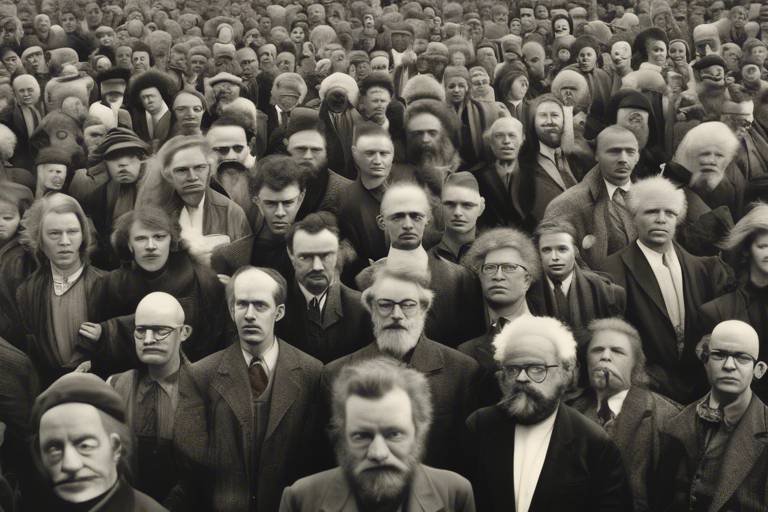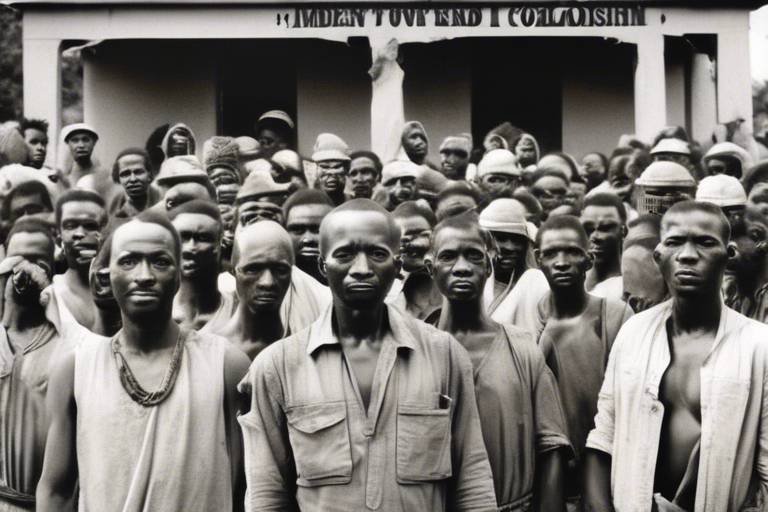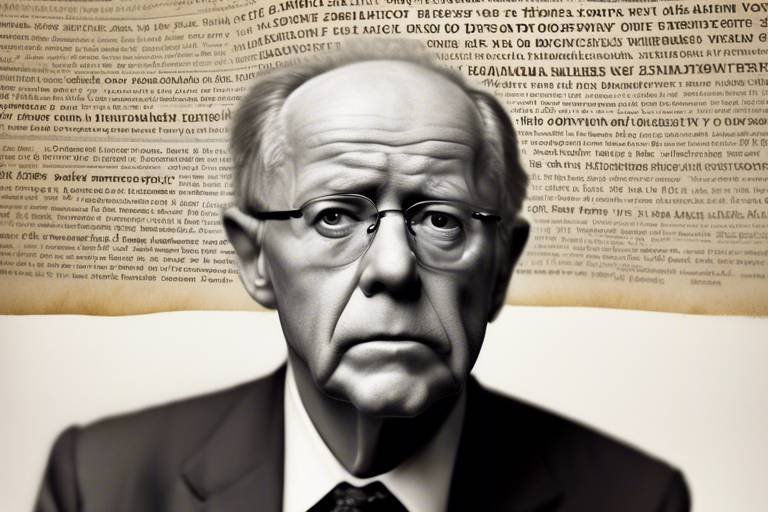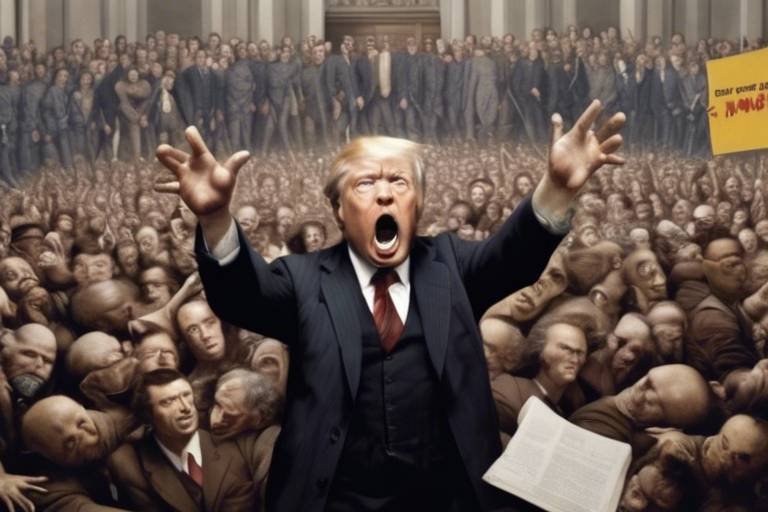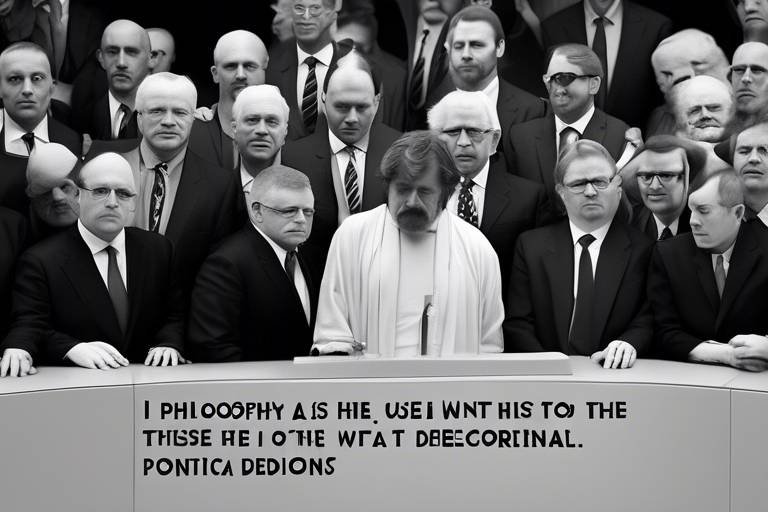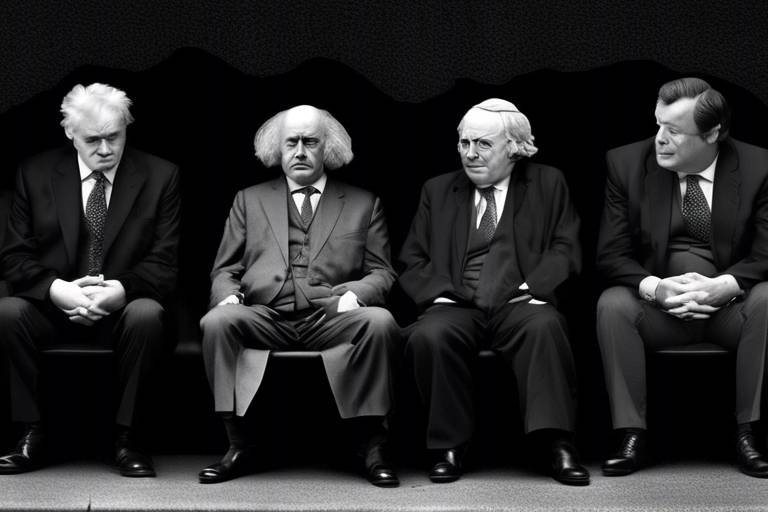A Philosophical Examination of the Role of Media in Politics
The intricate relationship between media and politics has been a subject of philosophical inquiry for decades. As we navigate through an era defined by rapid technological advancements and an overwhelming influx of information, it becomes increasingly essential to understand how media shapes our political landscape. The media serves not only as a conduit for information but also as a powerful influencer of public perception, opinion, and ultimately, political outcomes. This article will delve into the philosophical perspectives surrounding this relationship, exploring the ethical considerations that arise, and examining the implications for democracy and public discourse.
Historically, the evolution of media has undergone significant transformations, each stage reshaping political communication and public engagement. From the advent of the printing press in the 15th century, which democratized information dissemination, to the rise of radio and television in the 20th century, media has continually adapted to the needs and technologies of the time. Today, we find ourselves in the digital age, where social media platforms dominate the political arena.
Consider how Twitter and Facebook have changed the way politicians communicate with the public. No longer confined to traditional press releases or speeches, politicians can now engage directly with constituents, bypassing traditional media filters. This shift has made political discourse more accessible but has also introduced new challenges, such as the spread of misinformation and the polarization of opinions. The question arises: has this direct communication strengthened democracy, or has it diluted the quality of political discourse?
As we explore the ethical responsibilities of media outlets, it becomes clear that their role extends beyond mere reporting. Media organizations have a moral obligation to ensure accuracy, maintain impartiality, and foster an informed citizenry. In an age where sensationalism often overshadows substance, the commitment to ethical journalism is more crucial than ever.
Media bias is a pervasive issue that can significantly shape public perceptions and opinions on political matters. When media outlets prioritize sensational stories or adopt a particular political slant, they risk distorting the truth and misleading the public. This bias can manifest in various forms, including selective reporting, framing of issues, and the omission of critical perspectives.
For instance, consider the following table that illustrates how different media outlets may present the same political event:
| Media Outlet | Headline | Focus |
|---|---|---|
| Outlet A | "Government's New Policy: A Step Forward for Progress" | Positive spin on government actions |
| Outlet B | "Critics Slam Government's New Policy as Ineffective" | Highlighting opposition |
| Outlet C | "Experts Weigh In: Is the New Policy Effective?" | Balanced analysis |
This table exemplifies how media bias can influence public opinion by framing political issues in various ways. The challenge for citizens is to discern these biases and seek out diverse perspectives to form a well-rounded understanding of political events.
Social media has revolutionized political engagement, allowing for unprecedented levels of interaction between politicians and citizens. Platforms like Instagram and TikTok have become essential tools for political campaigns, enabling candidates to reach younger audiences in creative ways. However, this new landscape is not without its pitfalls. The rapid spread of misinformation poses a significant threat to informed public discourse, raising questions about the responsibility of social media companies in moderating content.
As we grapple with the complexities of media in politics, regulatory challenges emerge. Issues such as censorship, misinformation, and the need for policies that protect democratic values in digital spaces are at the forefront of public debate. Striking a balance between free speech and responsible media practices is essential to ensure that democracy thrives in the digital age.
The ownership structures of media outlets can significantly impact editorial choices and the diversity of political representation. When a handful of corporations control the majority of news outlets, there is a risk of homogenized content that fails to reflect the rich tapestry of public opinion. This concentration of media ownership raises concerns about the potential for propaganda and the suppression of dissenting voices.
To navigate the complexities of modern media, media literacy is paramount. Empowering citizens to critically engage with information, discern credible sources, and contribute to a healthy democratic process is essential. Media literacy initiatives can equip individuals with the skills needed to evaluate news critically and participate meaningfully in political discourse.
Various educational programs aim to enhance media literacy among different demographics. Schools, community organizations, and online platforms are stepping up to provide resources that foster informed and engaged citizens. These initiatives play a crucial role in building resilience against misinformation and promoting a more informed electorate.
As we look to the future, the role of media in political engagement will continue to evolve. Technological advancements will reshape how information is disseminated and consumed, presenting both opportunities and challenges for democracy. The question remains: how can we harness these changes to foster a more informed and engaged public?
- What is media bias? Media bias refers to the perceived or real partiality in news reporting that can influence public opinion.
- How does social media impact political engagement? Social media allows for direct communication between politicians and citizens, increasing engagement but also spreading misinformation.
- Why is media literacy important? Media literacy empowers citizens to critically evaluate information, helping them to make informed decisions in a democratic society.
- What are the ethical responsibilities of media outlets? Media outlets have a responsibility to report accurately, maintain impartiality, and ensure that they contribute to an informed citizenry.

The Evolution of Media in Political Discourse
The relationship between media and politics has undergone a remarkable transformation over the centuries, evolving from the humble beginnings of print to the dynamic digital landscape we navigate today. In the early days, political discourse was largely confined to printed materials such as pamphlets and newspapers, which served as the primary means for disseminating information and shaping public opinion. These print media outlets played a crucial role in informing citizens about political events, debates, and ideologies, acting as the backbone of democratic engagement. However, as technology advanced, so too did the methods of communication, leading to a significant shift in how political messages are crafted and consumed.
The advent of radio and television brought about a new era of political discourse, allowing for real-time broadcasts that could reach millions of people simultaneously. This shift not only changed the speed at which information was shared but also introduced a new dimension to political communication: the visual element. Politicians began to understand the power of imagery and performance, leading to a more theatrical approach to politics. Iconic moments, such as John F. Kennedy's televised debates against Richard Nixon, illustrated how media could influence public perception and voting behavior. The visual medium became a powerful tool in shaping narratives and creating political personas, often overshadowing the substance of the message itself.
As we moved into the 21st century, the rise of the internet and social media platforms revolutionized political discourse once again. The digital age has empowered individuals to not only consume information but also to create and share it, leading to a more participatory form of political engagement. Social media platforms like Twitter, Facebook, and Instagram have become the new town squares, where citizens can voice their opinions, mobilize support, and hold politicians accountable. This democratization of information has had profound implications for political campaigns, as candidates now engage directly with voters, bypassing traditional media gatekeepers.
However, this evolution is not without its challenges. The rapid spread of misinformation and the phenomenon of echo chambers—where individuals only engage with viewpoints that reinforce their own—have raised critical questions about the quality of political discourse in the digital age. As media outlets adapt to these changes, they face the ethical responsibility of ensuring that the information they provide is accurate and reliable. The transition from print to digital has also led to a fragmentation of media sources, making it increasingly difficult for citizens to discern credible information from sensationalized content.
In summary, the evolution of media in political discourse reflects a complex interplay between technology and communication. From the printed word to the immediacy of social media, each stage has shaped how we engage with politics and understand our world. As we continue to navigate this ever-changing landscape, it is essential to remain vigilant about the impact of media on democracy and to foster a culture of critical engagement that empowers citizens to participate meaningfully in political discussions.
- How has social media changed political communication?
Social media has transformed political communication by allowing direct interaction between politicians and citizens, enabling real-time feedback and engagement. - What are the risks associated with digital media in politics?
The risks include the spread of misinformation, polarization of public opinion, and the potential for manipulation of narratives. - Why is media literacy important in today's political landscape?
Media literacy is crucial because it empowers individuals to critically evaluate information sources, fostering informed citizenship and healthy democratic processes.

The Ethical Responsibilities of Media Outlets
In today's fast-paced world, where information travels at the speed of light, the ethical responsibilities of media outlets have never been more critical. Media organizations wield immense power; they shape narratives, influence public opinion, and hold those in power accountable. With great power comes great responsibility, and it is essential for media outlets to navigate this landscape with integrity and transparency.
First and foremost, media outlets must prioritize accuracy in their reporting. In an age where misinformation can spread like wildfire, the duty to verify facts before publication is paramount. Journalists and editors are tasked with the responsibility of ensuring that the information they disseminate is not only factual but also contextually relevant. This means double-checking sources, corroborating claims, and providing a balanced view of events. A commitment to accuracy not only enhances credibility but also fosters trust between the media and the public.
Another crucial ethical responsibility is impartiality. Media outlets should strive to present news without bias, allowing audiences to form their own opinions based on objective information. This can be particularly challenging in a polarized political climate where media bias is often perceived as a norm. To combat this, outlets must be transparent about their editorial choices and provide diverse perspectives on issues. This not only enriches public discourse but also ensures that all voices are heard, contributing to a more informed citizenry.
Moreover, media organizations have an ethical obligation to protect the public interest. This involves prioritizing stories that matter to the community and shining a light on issues that may otherwise remain in the shadows. Whether it’s reporting on social injustices, environmental concerns, or political corruption, the media plays a vital role in advocating for the voiceless. In doing so, they help facilitate a more equitable society where important issues are addressed and discussed.
To further illustrate these responsibilities, consider the following table that outlines key ethical principles for media outlets:
| Ethical Principle | Description |
|---|---|
| Accuracy | Ensuring all information is fact-checked and reliable. |
| Impartiality | Presenting news in a balanced manner without bias. |
| Public Interest | Focusing on stories that benefit the community and society. |
| Transparency | Being open about editorial processes and potential conflicts of interest. |
In addition to these principles, media outlets must also recognize the importance of accountability. When errors occur, it is essential for organizations to own up to their mistakes and correct them promptly. This not only demonstrates integrity but also reinforces the notion that the media is a reliable source of information. Accountability can take many forms, from issuing public corrections to engaging with audiences about their concerns and feedback.
Finally, as the media landscape continues to evolve with the rise of digital platforms, outlets must adapt their ethical frameworks to address new challenges such as misinformation and censorship. In this digital age, the lines between news and opinion often blur, making it imperative for media organizations to maintain clear boundaries. By doing so, they can uphold their ethical responsibilities and contribute positively to the democratic process.
In conclusion, the ethical responsibilities of media outlets are multifaceted and crucial for the health of our democracy. By prioritizing accuracy, impartiality, public interest, and accountability, media organizations can not only enhance their credibility but also empower citizens to engage more meaningfully with the world around them.
- Why is accuracy important in media reporting? Accuracy builds trust and credibility, ensuring that the public receives reliable information.
- How can media outlets ensure impartiality? By presenting multiple viewpoints and avoiding sensationalism, media can provide balanced reporting.
- What role does media play in democracy? Media acts as a watchdog, holding power accountable and providing citizens with essential information to make informed decisions.

Media bias is like a double-edged sword in the realm of politics; it can either illuminate the truth or obscure it. At its core, media bias refers to the tendency of journalists and news outlets to present information in a way that reflects their own opinions or the interests of their owners, rather than providing a balanced view. This can manifest in various forms, such as selective reporting, sensationalism, or even outright misinformation. The implications of media bias are profound, as they can significantly shape public perception and influence political outcomes.
Consider this: when a news outlet consistently portrays a political party or candidate in a negative light, while favorably covering their opponents, it can create a skewed narrative that affects how the public perceives those individuals. This is not just mere speculation; studies have shown that media consumption can alter voter behavior. For instance, a survey conducted by the Pew Research Center revealed that individuals who consumed news from sources with a strong partisan slant were more likely to have extreme views on political issues compared to those who sought out diverse news sources.
Moreover, the role of social media has amplified the effects of media bias. Platforms like Twitter and Facebook can serve as echo chambers, where users are exposed primarily to viewpoints that reinforce their existing beliefs. This phenomenon can lead to the polarization of public opinion, making it increasingly difficult for individuals to engage in constructive dialogue across political divides. In essence, media bias not only affects how news is reported but also how it is consumed, creating a feedback loop that can entrench divisions within society.
To illustrate the impact of media bias, let’s take a look at a simple table that outlines the differences in coverage of a specific political event by various media outlets:
| Media Outlet | Headline | Tone |
|---|---|---|
| Outlet A | "Candidate X's Controversial Decision Sparks Outrage" | Negative |
| Outlet B | "Candidate Y Responds to Criticism with Poise" | Positive |
| Outlet C | "Political Turmoil: A Closer Look at Recent Events" | Neutral |
This table highlights how different media outlets can frame the same political event in vastly different ways, which can lead to divergent public opinions. When readers consume news from these outlets, they are not just receiving information; they are absorbing a particular narrative that can shape their understanding and beliefs about the political landscape.
In conclusion, the impact of media bias on public opinion is a critical issue that cannot be overlooked. As consumers of news, it is essential for individuals to be aware of the potential biases present in the media they consume. By actively seeking out diverse perspectives and questioning the narratives presented to them, citizens can better navigate the complex world of political discourse and contribute to a more informed and engaged electorate.
- What is media bias? Media bias refers to the tendency of news outlets to present information in a way that reflects their own opinions or interests rather than providing an impartial viewpoint.
- How does media bias affect public opinion? Media bias can shape how individuals perceive political events and candidates, potentially influencing their beliefs and voting behavior.
- What can individuals do to combat media bias? Individuals can seek out diverse news sources, critically evaluate the information they consume, and engage in discussions with people holding different viewpoints.

In today's fast-paced world, social media has become a powerful force in shaping political discourse. Gone are the days when political communication was limited to traditional platforms like newspapers and television. Now, with just a few taps on a smartphone, politicians can reach millions of citizens directly. This shift has not only transformed how politicians campaign but has also changed how voters engage with political issues. But what does this all mean for our democracy?
Social media platforms such as Twitter, Facebook, and Instagram have democratized the flow of information, allowing anyone with an internet connection to voice their opinions and share their insights. This has led to a more vibrant public discourse, where diverse perspectives can be heard. However, the flip side of this accessibility is the spread of misinformation. With the rapid sharing of content, false information can go viral in an instant, leading to confusion and distrust among the electorate.
Moreover, social media has enabled politicians to bypass traditional media gatekeepers. They can communicate their messages directly to the public, control their narratives, and engage with constituents in real-time. This direct line of communication can foster a sense of connection between politicians and the public, making politicians seem more relatable and accessible. However, it also raises questions about accountability. When politicians can curate their messages without the scrutiny of journalists, how do we ensure that they are held responsible for their statements and actions?
Another significant aspect of social media's role in politics is its ability to mobilize grassroots movements. Hashtags like #BlackLivesMatter and #MeToo have ignited global conversations and spurred action on critical social issues. These movements demonstrate the potential of social media to unite people around common causes and drive change. However, the challenge remains: how do we sustain this momentum beyond online engagement? Activism must translate from the digital realm to tangible actions in the real world.
To illustrate the influence of social media on political engagement, consider the following table that outlines key statistics:
| Statistic | Percentage |
|---|---|
| Voters who use social media for political news | 53% |
| Politicians who engage with constituents on social media | 72% |
| People who believe social media has increased political polarization | 64% |
As we navigate this new landscape, it’s crucial to recognize the dual role of social media as both a tool for empowerment and a potential source of division. The challenge lies in harnessing its benefits while mitigating its risks. This calls for a collective effort from individuals, media organizations, and policymakers to promote responsible use of social media, ensuring that it serves as a platform for constructive dialogue rather than a breeding ground for divisiveness.
In conclusion, social media is undeniably a game-changer in modern politics. It has reshaped how we communicate, engage, and mobilize around political issues. As we look to the future, it’s essential to embrace the opportunities it presents while remaining vigilant about the challenges it poses. How we navigate this evolving landscape will ultimately determine the health of our democracy.
- How has social media changed political campaigns? Social media allows for direct communication between politicians and voters, enabling campaigns to reach a wider audience quickly.
- What are the risks associated with social media in politics? The main risks include the spread of misinformation, echo chambers, and increased political polarization.
- How can citizens ensure they are getting accurate information on social media? Citizens can improve their media literacy, cross-check information from multiple sources, and be skeptical of sensational headlines.

In today's digital age, the intersection of media and politics is fraught with complexities that demand careful consideration. As media outlets evolve and adapt to new technologies, regulatory challenges become more pronounced. One major issue is the proliferation of misinformation, which can spread like wildfire across social media platforms, often outpacing the ability of regulatory bodies to respond effectively. This raises critical questions: How do we ensure that information disseminated through these channels is accurate? What measures can be put in place to protect the integrity of public discourse?
Another significant challenge is censorship. While the intention behind censorship may be to protect citizens from harmful content, it often walks a fine line between safeguarding democracy and infringing on free speech. Governments and regulatory agencies must navigate this precarious landscape, ensuring that regulations do not suppress legitimate political expression. The balance between regulation and freedom of expression is delicate, and any misstep could have profound implications for democratic engagement.
To address these challenges, several potential solutions have been proposed. For instance, the implementation of fact-checking initiatives can serve as a robust defense against the spread of misinformation. By partnering with independent organizations that specialize in verifying the accuracy of news stories, media outlets can enhance their credibility and foster a more informed public. Additionally, regulatory frameworks should encourage transparency in media ownership and funding sources, thereby allowing consumers to better understand the motivations behind the content they consume.
Moreover, digital literacy programs play a crucial role in empowering citizens to critically evaluate the information they encounter. By equipping individuals with the tools to discern credible sources from unreliable ones, these initiatives can mitigate the effects of misinformation. Schools, community organizations, and even media companies can collaborate to create educational resources that promote media literacy across various demographics.
Lastly, international cooperation is essential in tackling these regulatory challenges. As media transcends borders, a unified approach to regulation can help establish standards that protect democratic values globally. By sharing best practices and developing cross-border policies, nations can work together to create a safer and more informed media landscape.
In conclusion, while regulatory challenges in the media landscape are daunting, they are not insurmountable. Through a combination of fact-checking initiatives, increased transparency, digital literacy programs, and international cooperation, we can cultivate a media environment that not only informs but also uplifts democratic values. As we move forward, it is imperative that we remain vigilant and proactive in addressing these challenges, ensuring that the media continues to serve as a pillar of democracy rather than a source of division.
- What is the role of media in politics? Media serves as a conduit for information, shaping public opinion and facilitating political discourse.
- How does misinformation affect democracy? Misinformation can lead to misinformed citizens, eroding trust in institutions and undermining democratic processes.
- What are some solutions to combat misinformation? Solutions include fact-checking initiatives, promoting media literacy, and ensuring transparency in media ownership.
- Why is media literacy important? Media literacy empowers citizens to critically evaluate information, fostering informed engagement in democratic processes.
- How can governments regulate media without infringing on free speech? By establishing clear guidelines that promote transparency and accountability, while also protecting the right to free expression.

The ownership structure of media outlets plays a significant role in shaping the content that is produced and broadcasted to the public. When we think about who owns our news sources, it’s crucial to recognize that these owners often have their own agendas, which can subtly influence the narratives presented to audiences. For instance, a media company owned by a large corporation may prioritize content that aligns with the interests of its parent company, potentially skewing the information provided to the public.
Moreover, the concentration of media ownership can lead to a homogenization of viewpoints. When a few corporations control a significant portion of media outlets, the diversity of perspectives diminishes. This can create an echo chamber effect, where similar opinions are repeated and amplified, leaving little room for dissenting voices. In such an environment, the public may find it increasingly challenging to access a well-rounded view of political issues, which is essential for informed decision-making.
To illustrate this point, consider the following table that outlines the ownership of major media companies and their potential influence on content:
| Media Company | Parent Company | Potential Bias |
|---|---|---|
| ABC News | The Walt Disney Company | Entertainment and family-friendly content |
| CNN | Warner Bros. Discovery | Progressive leaning |
| Fox News | Fox Corporation | Conservative leaning |
| The New York Times | The New York Times Company | Progressive and liberal viewpoints |
As we can see, the ownership of these media outlets can lead to specific biases that influence how news is reported and interpreted. This situation raises ethical questions about the responsibility of media owners to provide balanced coverage and the implications of their ownership on public discourse.
Furthermore, the influence of media ownership extends beyond just the news. It can affect entertainment programming, political commentary, and even educational content. When the same entity controls various types of media, there’s a risk that the narratives will be crafted to serve the interests of the owner rather than the public good.
In addition, the rise of digital media has complicated this landscape. Many traditional media companies have been acquired by larger conglomerates, further consolidating power. This shift has made it even more critical for consumers to be aware of who owns the media they consume. Understanding the ownership behind media outlets can empower citizens to critically evaluate the information presented to them.
Ultimately, the influence of media ownership on content is a double-edged sword. While it can provide resources for high-quality journalism, it can also lead to biased reporting and a lack of diverse viewpoints. As consumers of information, it is our responsibility to seek out multiple sources and remain vigilant about the potential biases that may color our understanding of political issues.
- How does media ownership affect political reporting?
Media ownership can shape the narratives and perspectives presented in political reporting, often aligning them with the interests of the owners. - What can consumers do to ensure they get diverse viewpoints?
Consumers can seek out various news sources, including independent and international media, to gain a broader understanding of issues. - Why is media literacy important in the context of ownership?
Media literacy helps individuals critically assess information and recognize potential biases, enabling them to make informed decisions.

In today's fast-paced information age, media literacy has become an essential skill for every citizen. But what exactly does it mean to be media literate? At its core, media literacy involves the ability to access, analyze, evaluate, and create media in various forms. It's not just about consuming content; it's about understanding the context, recognizing bias, and discerning fact from fiction. This skill is particularly vital in a democratic society where informed citizens are the backbone of governance.
Imagine trying to navigate a bustling marketplace filled with vendors shouting about their wares. If you don't know how to differentiate between quality products and mere noise, you might end up with something that doesn’t serve you well. Similarly, in the realm of information, media literacy equips individuals with the tools to sift through the overwhelming amount of content available today. It empowers them to identify credible sources, understand different perspectives, and engage in meaningful dialogue about political issues.
The importance of media literacy in democracy can be highlighted through several key aspects:
- Informed Decision-Making: A media-literate citizen is better equipped to make informed choices during elections. They can critically evaluate candidates' platforms, understand political advertisements, and discern the motives behind various media narratives.
- Combatting Misinformation: In an era where misinformation spreads like wildfire, media literacy acts as a fire extinguisher. It enables individuals to recognize false information and fact-check claims, thus protecting the integrity of public discourse.
- Encouraging Civic Engagement: When citizens are knowledgeable about the media landscape, they are more likely to engage in civic activities, such as voting, attending town hall meetings, or participating in community discussions.
Moreover, media literacy fosters a culture of critical thinking. It challenges individuals to question the status quo and to think beyond the headlines. In a democratic society, this is crucial, as it promotes a healthy exchange of ideas and helps to prevent the monopolization of discourse by a select few. Just like a well-rounded diet is necessary for physical health, a well-rounded understanding of media is essential for the health of a democracy.
To further illustrate the significance of media literacy, consider the following table that outlines the differences between media-literate and non-media-literate individuals:
| Aspect | Media-Literate Individuals | Non-Media-Literate Individuals |
|---|---|---|
| Source Evaluation | Critically assesses the credibility of sources | Takes information at face value |
| Understanding Bias | Recognizes bias and perspective | Unaware of bias in media |
| Engagement | Actively participates in civic discourse | Passive consumer of information |
As we look to the future, the need for media literacy will only grow. With the advent of new technologies and platforms, the landscape of information is constantly evolving. Educational initiatives aimed at enhancing media literacy are essential in preparing citizens to navigate this complex environment. Programs in schools, community centers, and online platforms can provide the necessary training to help individuals develop these critical skills.
In conclusion, media literacy is not merely an academic concept; it is a vital component of a thriving democracy. By fostering a population that is skilled in media literacy, we can ensure that our democratic processes remain robust, informed, and reflective of the diverse voices within society. As we continue to grapple with the challenges posed by misinformation and media bias, investing in media literacy education will be one of the most impactful steps we can take towards a healthier democratic future.
- What is media literacy? Media literacy is the ability to access, analyze, evaluate, and create media in various forms.
- Why is media literacy important for democracy? It empowers citizens to make informed decisions, combat misinformation, and engage in civic activities.
- How can I improve my media literacy? You can improve your media literacy by critically evaluating sources, fact-checking information, and participating in educational programs.

In today’s fast-paced digital world, where information is at our fingertips, the importance of media literacy cannot be overstated. It serves as a crucial skill set that empowers individuals to navigate the complex landscape of news and information effectively. Various education initiatives have emerged to enhance media literacy, targeting different demographics, from school children to adults. These initiatives aim to equip citizens with the tools necessary to critically analyze and engage with media content, fostering a more informed and engaged populace.
Schools are increasingly recognizing the need to incorporate media literacy into their curricula. For instance, many educational institutions are introducing comprehensive programs that focus on critical thinking, source evaluation, and the understanding of media biases. These programs not only teach students how to discern credible information but also encourage them to question the motives behind various media outlets. By integrating media literacy into subjects like social studies or language arts, educators are creating a generation that is not just consumers of information but also critical thinkers.
Moreover, community organizations and non-profits are stepping up to fill the gaps in media education. They often offer workshops and seminars that cater to adults, particularly those who may not have had access to such education during their formative years. These initiatives typically cover a range of topics, such as identifying fake news, understanding algorithms that shape our online experiences, and recognizing the influence of social media on public opinion. The goal is to create a society where individuals can confidently engage with media and contribute meaningfully to public discourse.
One notable example of an effective media literacy initiative is the News Literacy Project. This program engages educators and students in understanding the role of journalism in a democratic society. Through interactive lessons and resources, participants learn to evaluate news sources critically and understand the importance of reliable information in shaping informed citizens. Such initiatives are vital in combating misinformation and fostering a culture of accountability among media consumers.
In addition to formal education, there are also online resources and platforms dedicated to promoting media literacy. Websites like MediaSmarts offer a plethora of tools, lesson plans, and activities that educators can use to teach media literacy effectively. These resources are particularly valuable in our increasingly digital age, where online misinformation spreads rapidly. By utilizing these platforms, educators can tailor their lessons to meet the needs of their students, ensuring that media literacy education remains relevant and impactful.
Ultimately, the success of these education initiatives hinges on collaboration among educators, policymakers, and community leaders. By working together, they can create a robust framework that prioritizes media literacy as a fundamental skill for all citizens. As we continue to navigate the complexities of a media-saturated environment, fostering media literacy will be essential in preserving the integrity of public discourse and enhancing the democratic process.
- What is media literacy?
Media literacy is the ability to access, analyze, evaluate, and create media in various forms. It empowers individuals to understand the role of media in society and make informed decisions. - Why is media literacy important?
In an age of misinformation and biased reporting, media literacy is crucial for fostering informed citizens who can engage critically with information and contribute to democratic processes. - How can I improve my media literacy?
You can improve your media literacy by engaging with educational resources, participating in workshops, and practicing critical thinking when consuming media content.

As we stand on the brink of a new era in political engagement, the role of media is evolving at a pace that is both exhilarating and daunting. The fusion of technology and communication has opened up unprecedented avenues for political discourse, allowing citizens to engage with their leaders and each other in ways that were unimaginable just a few decades ago. Imagine a world where your voice can be amplified by a simple tweet or a Facebook post, reaching thousands, if not millions, in mere seconds. This is not just a dream; it is the reality of our digital age.
However, with great power comes great responsibility. The future of media in politics is not just about the tools we use but also about how we wield them. As social media platforms continue to grow, they become double-edged swords—facilitating dialogue and participation while also posing risks of misinformation and polarization. The challenge lies in navigating this complex landscape. Will we harness the potential of these platforms to foster meaningful conversations, or will we allow them to devolve into echo chambers where only like-minded voices are heard?
Moreover, the rise of artificial intelligence and algorithms in content curation is reshaping how information is disseminated. Algorithms decide what news appears on our feeds, often prioritizing sensationalism over substance. This raises critical questions about media literacy and the need for individuals to develop skills to discern credible information from the noise. As we look to the future, it is essential that we cultivate a populace that is not only engaged but also equipped to critically evaluate the media they consume.
In light of these challenges, educational initiatives focusing on media literacy are more important than ever. Schools, universities, and community organizations must step up to provide resources that teach individuals how to navigate the digital landscape effectively. By empowering citizens with the tools to analyze and question the information they encounter, we can foster a more informed electorate capable of participating in democratic processes.
Furthermore, the concept of digital citizenship will play a vital role in the future of political engagement. As individuals become more active online, understanding one’s rights and responsibilities in the digital space is crucial. This includes recognizing the impact of one’s words and actions on social media, as well as the importance of respectful discourse. In this way, the future of media in politics is not just about technology; it’s about cultivating a culture of responsibility and engagement.
As we embrace these changes, we must also consider the regulatory frameworks that govern media operations. Striking a balance between free expression and the need to combat harmful content will be a delicate task for policymakers. Future regulations should focus on transparency, ensuring that citizens understand how their data is used and how information is curated. A collaborative approach between tech companies, governments, and civil society will be essential in creating a media landscape that supports democratic values.
In conclusion, the future of media in political engagement is a tapestry woven with both promise and peril. As we navigate this evolving terrain, it is crucial to remain vigilant and proactive. By fostering media literacy, promoting responsible digital citizenship, and advocating for fair regulations, we can ensure that the media serves as a catalyst for democratic engagement rather than a barrier. The question we must ask ourselves is: how will we shape this future together?
- What role does social media play in political engagement?
Social media serves as a platform for direct communication between politicians and citizens, enabling real-time discussions and feedback. - How can individuals improve their media literacy?
Individuals can enhance their media literacy by seeking educational resources, questioning the credibility of sources, and engaging in discussions about media content. - What are the risks associated with digital media in politics?
Risks include the spread of misinformation, polarization of public opinion, and the potential for echo chambers that limit exposure to diverse viewpoints. - How can regulations help shape the future of media?
Regulations can promote transparency, protect user data, and ensure that media platforms uphold democratic values while balancing free expression.
Frequently Asked Questions
- What is the relationship between media and politics?
The relationship between media and politics is deeply intertwined. Media serves as a platform for political discourse, influencing public opinion and shaping political agendas. It acts as a watchdog, holding politicians accountable while also providing citizens with the information they need to make informed decisions.
- How has the evolution of media affected political communication?
The evolution of media, from print to digital, has dramatically transformed political communication. With the rise of the internet and social media, information can be disseminated instantly, allowing for greater public engagement. However, this also raises concerns about the accuracy and reliability of information.
- What are the ethical responsibilities of media outlets?
Media outlets have a moral obligation to report news accurately and impartially. This includes fact-checking, avoiding sensationalism, and ensuring diverse perspectives are represented. Ethical journalism fosters an informed citizenry, which is essential for a healthy democracy.
- What is media bias, and how does it impact public opinion?
Media bias refers to the perceived or actual partiality in news reporting. It can manifest through selective reporting, framing, or language choices. Such biases can significantly shape public perceptions and opinions on political issues, leading to polarized viewpoints and misinformation.
- How does social media influence modern politics?
Social media has revolutionized political engagement by enabling direct communication between politicians and citizens. It allows for rapid information sharing and grassroots mobilization. However, it also poses challenges, such as the spread of misinformation and the potential for echo chambers.
- What regulatory challenges does the media face?
Media faces various regulatory challenges, including censorship, misinformation, and the need for policies that protect democratic values. Balancing freedom of expression with the need to combat harmful content is a complex issue that policymakers must navigate.
- How does media ownership affect content?
The ownership structure of media outlets can significantly influence editorial choices and the diversity of political representation. Concentrated ownership may lead to a narrow range of viewpoints, impacting public discourse and political diversity.
- Why is media literacy important for democracy?
Media literacy empowers citizens to critically engage with information and discern credible sources. In an age of information overload, being media literate is crucial for fostering informed citizens who can contribute to a healthy democratic process.
- What educational initiatives exist for enhancing media literacy?
Various educational programs aim to enhance media literacy across different demographics. These initiatives often focus on teaching critical thinking skills, understanding media production, and recognizing bias, ultimately fostering a more informed and engaged populace.
- What does the future hold for media in political engagement?
The future of media in political engagement is likely to be shaped by technological advancements. As new platforms emerge, they will continue to redefine how citizens interact with politics. This evolution may lead to increased participation but also necessitates ongoing discussions about ethics and accountability in the digital age.


